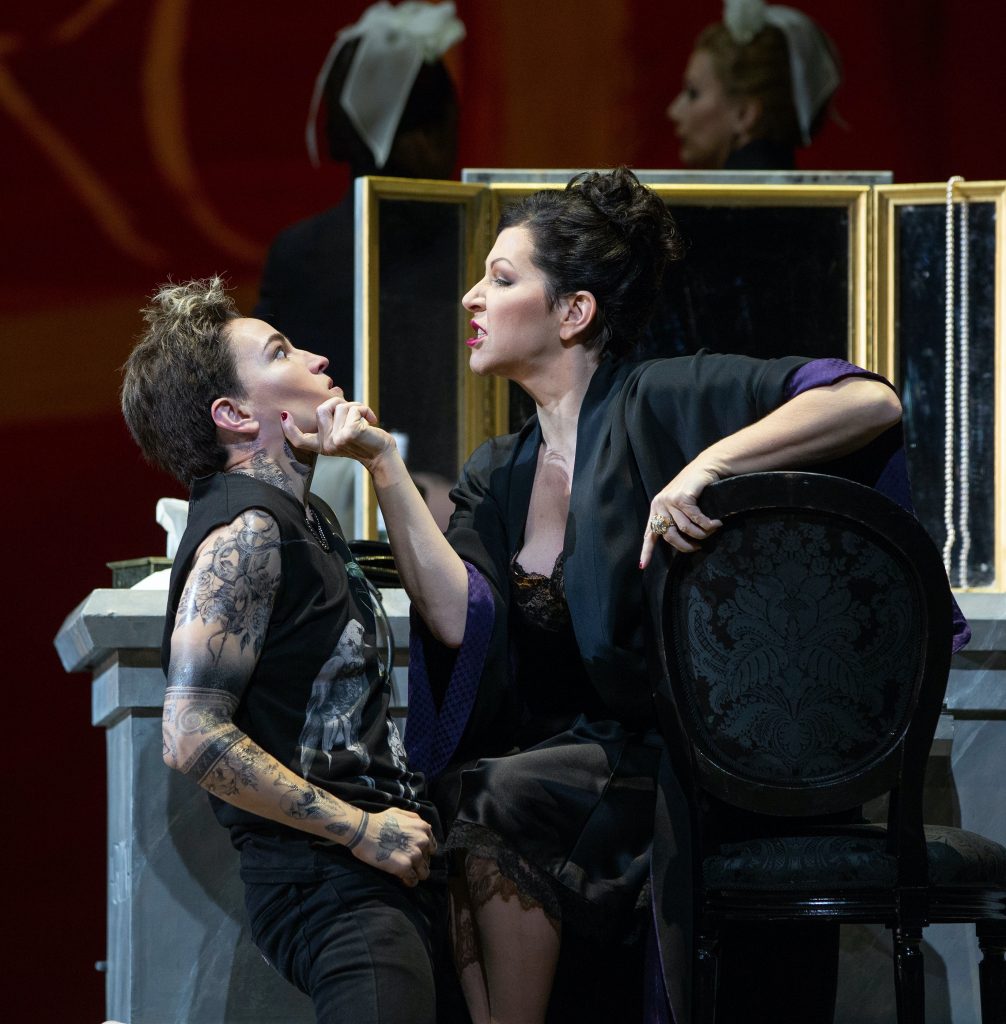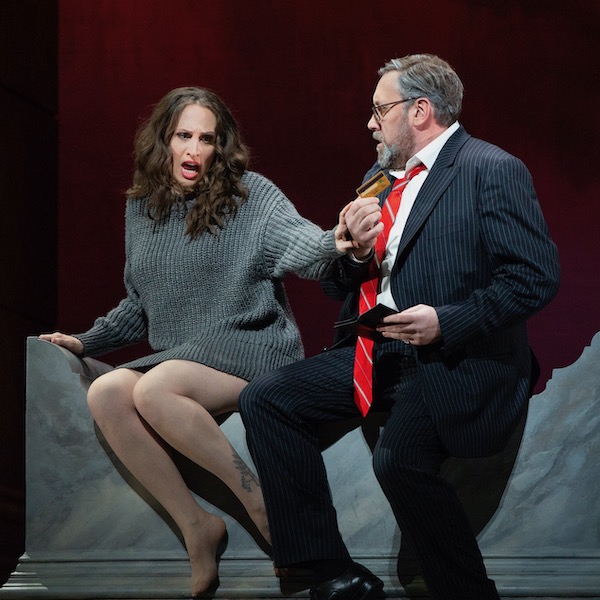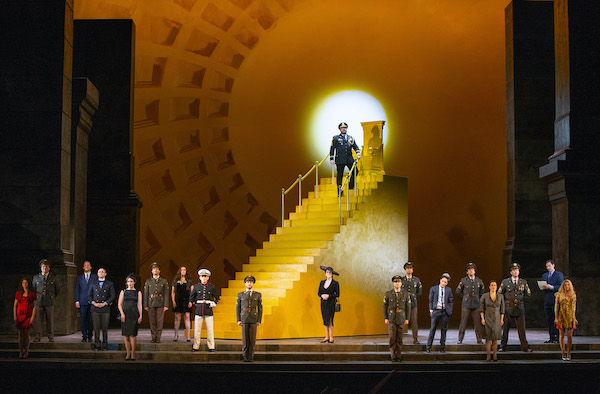Met’s modern-dress “Agrippina” stylishly balances comedy and deeper emotions

A modest request: more comedies on the opera stage, please.
As the premise that everyone is going to sing everything at you is basically ridiculous, operatic comedy is an ideal style for the medium. But once Richard Wagner began trying to educate and ennoble audiences, comic operas were pushed to the margins where they have largely stayed ever since.
Fortunately, George Frideric Handel made his operas to entertain, and produced some brilliant comic ones. Agrippina, written in 1709, is one of his best—despite its opera seria designation—and the Metropolitan Opera’s terrific new production, which opened Thursday night, showed that comedy remains an ideal vehicle to communicate musical beauty on the opera stage.
The title character (played by the great Handel mezzo-soprano Joyce DiDonato) is the wife of Roman emperor Claudio (bass Matthew Rose) and mother of Nerone (mezzo Kate Lindsey). Thinking Claudio dead, she tries to install her son on the throne, only to be thwarted by army commander Ottone (countertenor Iestyn Davies, dressed in a naval uniform), who saves Claudio from a shipwreck. Complications and hijinks ensue, including a love quadrangle involving Poppea (soprano Brenda Rae in her Met debut).
Though full of outwardly despicable people, this is far different than Monteverdi’s dark L’Incoronazione di Poppea, and its satire on grasping for power and being undone by lust is as contemporary as can be. And so producer David McVicar put the cast into modern dress—cocktail dresses, suits, military uniforms, and some leisure wear.
How modern? Nerone is a snot-nosed punk, with a sleeveless Anarchy t-shirt later exchanged for a suit with a skinny black tie. Lindsey was excellent, her insolent manner taking the character into Repo Man territory. Claudio wore a red tie that hung well below his ample gut, then later showed up with golf clubs and sporting a track suit. An extended scene in a bar featured a greaser, some impressive leisure suits, and a pas de deux between two drunk and horny patrons.
More than the modern look was the modern attitude, which was Marxist (as in the brothers, not Karl). Claudio blustered about the stage like a CEO giving a TED talk, Agrippina kept herself well-lubricated with nips from a handy flask (when she didn’t have a bottle in her hand). In one scene Poppea couldn’t find a cab in the rain, leaving her vulnerable to Claudio’s advances, and she medicated her later heartache with chocolates and Veuve Cliquot. Meanwhile, Nerone handed out donations to the poor—who he finds disgusting—because it’s the opportunity for a photo-op, complete with a news crew of slovenly cameramen and a chic reporter. All this was smart and worked because it was true and essential to the characters.
Inside this thinking was singing that was superb across the board. DiDonato had her typical color and fire from the first “Nerone” of her opening recitative, and sounded agile as ever in Handel’s showy runs. Lindsey sang at an equal level, and was wonderful all night on stage, moving around with a teenage boy’s awkward obnoxiousness. Her voice sat right at the edge of late adolescence and made for one of the most effective trouser-role performances in recent memory.

Rae’s bright, light soprano was an apt vocal contrast to the mezzos. Her “Vaghe perle” transformed the satirical tone of Act I into warmth. Taken together, the three women nearly dominated the production. Their characters have the most air time, but beyond that their singing was sumptuous all evening. Rose’s Claudio had excellent vocal focus and dexterity and a natural comic manner and all the principals drove the action and generated excitement.
Amidst the scheming and striving, there is ample lust-addled buffoonery. As Pallante baritone Duncan Rock hit the right balance between manliness and clownishness, and countertenor Nicholas Tamagna as Narciso (house debut) managed to convey the character’s weakness while singing beautifully.
The good guys in Agrippina are Poppea and Ottone, who loves her. Poppea and Ottone are the two innocents. Poppea is the one who engineers the denouement, and the commander is the one square among the vibrant characters. The dynamism of the comic roles and the singing was such that when he came to the fore, the energy went down several notches, even as Davies’ singing was impeccable.
But this was both a temporary condition and part of Handel’s subtlety. The opera has an extraordinary show-stopper, Agrippina’s Act II aria “Pensieri, voi mi tormenti,” full of slicing, stop-time minor key rhythms, a plaintive oboe echoing the vocal line. DiDonato pulled out all her intensity, and brought down the house. The deepest and most lingering effect, though came from Davies as Handel engineered in the score. Thinking himself betrayed and scorned by Poppea and all of Rome, he sings of his despair and loneliness in the recitative and aria “Otton, otton” and “Voi ch’udite.”
That music is the most sublime in the opera—the oboe reflecting the character’s feelings—and Davies was fabulous, standing alone in front of an opaque scrim showing the she-wolf who nursed Romulus and Remus. He shaped his sound and articulation through the sustained notes and shorter phrases, focusing on beauty and expressive understatement, letting the music open up to the listener and showing the sympathetic human feeling that offsets the bitter irony in the rest of the opera.
This was the musical high point of the performance, nearly equaled by the back and forth between Ottone and Poppea when they are reunited in Act II.
In this amazing scene, set in the bar; Poppea sang, drank, passed out facedown, and then came to when she heard Ottone. There was a harpsichord on stage, and keyboardist Bradley Brookshire, looking like a lounge lizard, came on to play a thrilling harpsichord solo, which inspired the patrons to dance and brought out the couple to do a louche pas de deux.
Bicket led a pared-down orchestra, augmented with lute, theorbo, and cellist David Heiss in the continuo group. Bicket is the leading conductor of Handel’s operas and a frequent collaborator with DiDonato. With modern strings and winds, the orchestral played sharp and lively phrases all evening. There was some fleeting messy moments in Act III, but in this fun and unexpectedly moving night at the Met, all was forgiven.
Agrippina continues through March 7. metopera.org








Posted Feb 23, 2020 at 10:46 am by CastaDiva
Went to this last night. Marvelous production, marvelous cast. What a delight!
Posted Feb 29, 2020 at 7:16 pm by Anton van Dijk
Watched the production today in HD Live. Absolutely wonderful!! But who is the other countertenor not listed on the program sheets?
Posted Feb 29, 2020 at 7:20 pm by TomF
Saw this today, great job by the director keeping the comedy going even when the performers aren’t doing much besides singing. Very enjoyable.
Posted Feb 29, 2020 at 7:28 pm by WARREN TAYLOR
To me, the modern sets and objects (golf cart) was totally distracting. I do want to focus on the music and not a golf game. The singers were grand but the modern look sometimes caused me to focus of matters not vocal. Warren Taylor
Posted Mar 01, 2020 at 10:43 am by Marcia Finberg
Watched the Saturday matinee broadcast in Phoenix, AZ. It’s hard to love Opera when seen on a movie theater screen. But this magnificent production reached through and grabbed us with its brilliant, creative staging and awesome voices.
Joyce DiDonato has been at the top of my radar screen since I saw her as Elena in La Donna di Lago in Santa Fe. As Agrippina, she mesmerized me. I was also stunned by Kate Lindsey’s transformative performance as Nerone; best performance of a trouser role ever!
Bravo to all associated with this memorable production.
Posted Mar 01, 2020 at 5:35 pm by Martín Caracoche
We saw it yesterday in HD live from Mexico City. What a spectacle! Congratulations to the singers, and mostly to the director. The opera was fun to watch and Haendel´s music sublime. The adaptation is not only correct but necessary considering the times we are living.
Posted Mar 01, 2020 at 9:07 pm by Joyce Noriega
This production proved Baroque Opera need not be static and boring. I hope it has created many converts amd encourages the Met to delve further into this marvellous repertoire. The Julio Cesare McVicar production a few years ago was another Handel hit opera.
I for one look forward to more of this great music adapted tastefully, unlike some of the Bayreuth over the top recent productions of Wagner operas……